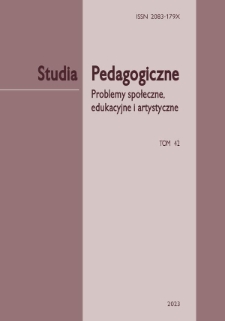Digital Library of the Jan Kochanowski University contains 13 083 digital objects
Object
Title: Body in the social domain of the internet – the effect of social comparisons on self-esteem and body-related behavior of young adults
Creator:
Group publication title:
Contributor:
Abstract:
The contemporary culture of consumption is putting the human body at the center of attention occupying more and more social space. The body is attributed great importance on an individual and social level. Mass media, including new interactive digital media, are an extremely powerful carrier of the sociocultural ideal of a beautiful body. The purpose of this article is to present the correlation between comparing one’s body image in the social media space and one’s self-esteem and body image-related behaviors undertaken among people in early adulthood. The study employed a diagnostic survey method, using the author’s online questionnaire involving 493 young adults – users of social networking sites. The results show that the more the respondents compared their bodies in the social media space, the worse they felt about them, while at the same time they undertook more behaviors aimed at improving their appearance. Dissatisfaction with the appearance of one’s own body causes numerous problems and difficulties in the dimension of psychosocial functioning, especially for young women. These issues should therefore be addressed in school prevention and education programs, as a measure to anticipate the occurrence of body image problems and their negative health consequences.
Table of contents:
SPIS TREŚCI
ARTYKUŁY I ROZPRAWY
TERESA WILK, O potrzebie szerszego wprowadzenia sztuki w szkolny proces edukacyjno-wychowawczy młodego pokolenia . . . . . . . . . . . . . .. . 11
KARINA LEKSY, Body in the social domain of the Internet – the effect of social comparisons on self-esteem and body-related behavior of young adults . . . . 25
JUSTYNA ŚWIERCZYŃSKA, BEATA PAWŁOWSKA, IZABELA CHOJNOWSKA- -ĆWIĄKAŁA, Mothers’ personality traits and psychological and social functioning of children with autism spectrum disorder . . . . . . . . . . . . . . . . . . . 43
BARBARA LULEK, Zabawa – praca – fascynacja. Obraz dzieciństwa w pracowni artystycznej . . . . .. . . . 71
PAULINA FORMA, An eclectic approach to the study of parental attitudes towards a disabled child. The context of St. John Paul II . . 87 ANNA RÓŻA MAKARUK, Ocena skuteczności Interpersonalnego Treningu Twórczego Myślenia (ITTM) w podnoszeniu poziomu samooceny jego uczestników . . .101
DANUTA NIKITENKO, Twórczość i kreatywność w świetle rozważań pedagogicznych (studenci pedagogiki na temat kreatywności) . . . . . . . . . . . . 117 KATARZYNA ROGOZIŃSKA, Zygmunt Noskowski (1846–1909) – sylwetka nauczyciela muzyki . .139
JUSTYNA SALA-SUSZYŃSKA, Wpływ gier na rozwój osobowości dziecka . . . . . . . 157
KATARZYNA SEGIET, Odpowiedzialność rodzicielska w obliczu przemian społecznych . . . . 173
MONIKA WOJTKOWIAK, Brotherhood in the aid service. The “Warrior Project” as a new form of development and support provided by soldiers to soldiers 189
ALEKSANDRA SOBAŃSKA, Postawy czytelnicze – próba konceptualizacji i ich znaczenie w badaniach edukacyjnych . . . . 199
BADANIA I KOMUNIKATY AGNIESZKA ZAJĄC, Rozumienie seksualności i wychowania seksualnego dzieci przez matki i nauczycielki przedszkola . . . 213
MARLENA STRADOMSKA, Pornografia 2.0. Nowe zagrożenia na podstawie studiów przypadków . . . . . . . 231
ANNA RÓG, ANNA SKOTNICKA, Czas wolny w czasie pandemii w perspektywie młodzieży ostatnich klas szkoły podstawowej – wybrane aspekty . . . . . . . . . . 245
WERONA KRÓL-GIERAT, VERA SAVIĆ, The diverse linguistic attainment and attitude development of children learning English as a foreign language in inclusive classes . . . . . . . . 261
DAMIAN LABIAK, Młodzi nauczyciele muzyki wobec wyzwań swojej profesji. Komunikat z badań . . . . . . 289
DOROTA RUSZKIEWICZ, Rodzeństwo w roli rodzicielskiej . . . . . . . 309
Place of publishing:
Physical description:
ISSN:
Publisher:
Wydawnictwo Uniwersytetu Jana Kochanowskiego w Kielcach
Date issued:
Identifier:
oai:bibliotekacyfrowa.ujk.edu.pl:12761 doi:10.25951/11147
Language:
Is part of:
Studia Pedagogiczne. Problemy społeczne, edukacyjne i artystyczne
Has part:
Type:
Access rights:
Format:
Object collections:
- Biblioteka Cyfrowa Uniwersytetu Jana Kochanowskiego > Wydawnictwo Uniwersyteckie
- Biblioteka Cyfrowa Uniwersytetu Jana Kochanowskiego > Wydawnictwo Uniwersyteckie > Wydawnictwa ciągłe
- Biblioteka Cyfrowa Uniwersytetu Jana Kochanowskiego > Wydawnictwo Uniwersyteckie > Wydawnictwa ciągłe > „Studia Pedagogiczne. Problemy społeczne, edukacyjne i artystyczne”
Last modified:
Apr 4, 2025
In our library since:
Apr 4, 2025
Number of object content hits:
31
All available object's versions:
https://bibliotekacyfrowa.ujk.edu.pl/publication/11147

